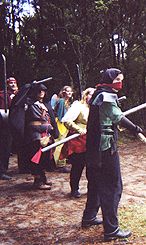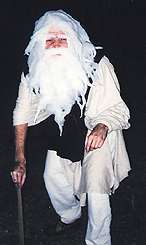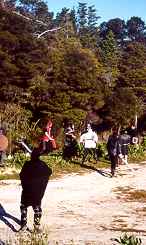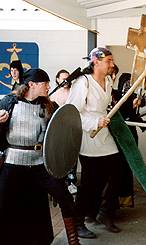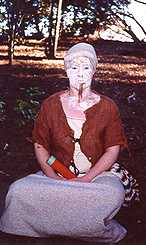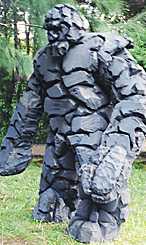 |
||||||||||||||||||||||||||||||||||||||||||||||||||||||||||||||||||||||||||||||||
|
The setting of Mordavia is an evolving work that the players and game masters cooperate to expand during and between games.
Because we give players a lot of leeway to create places, people and events that relate to their characters' backgrounds,
we have to be careful not to describe the setting in such detail that it will rein in people's creativity. Also, Mordavia
is a dark mysterious land set in a time when information is not easily available to the common people. To enhance that
mystery, we keep some setting information secret from players.
For these reasons the information here may seem sparse. Rest assured that great depth lurks beneath the surface. What Inspired Mordavia?
The setting of Mordavia is inspired by the setting of the computer game Quest for Glory 4: Shadows of Darkness, Copyright © 1994 Sierra Games. The characters of 'Erana', 'Katrina', and 'The Dark One' and its followers are also Copyright © 1994 Sierra Games. One of the founders of our game, Scott Farndon, was a great fan of the computer game and thought it would make an interesting setting for a live roleplaying game. We owe a debt of gratitude to Lori Cole and the other creators of the computer game. However, we have made considerable changes to the setting to adapt it to the live roleplaying medium and to encorporate the creativity of our participants. Fans of the original may find our version quite different. Most notably, "Mordavia" has increased in scope from a single village to an entire Kingdom. The Kingdom of Mordavia
Map
The Cartographers Guild of Eranov makes no guarantee of the accuracy of this map. Caveat viator.
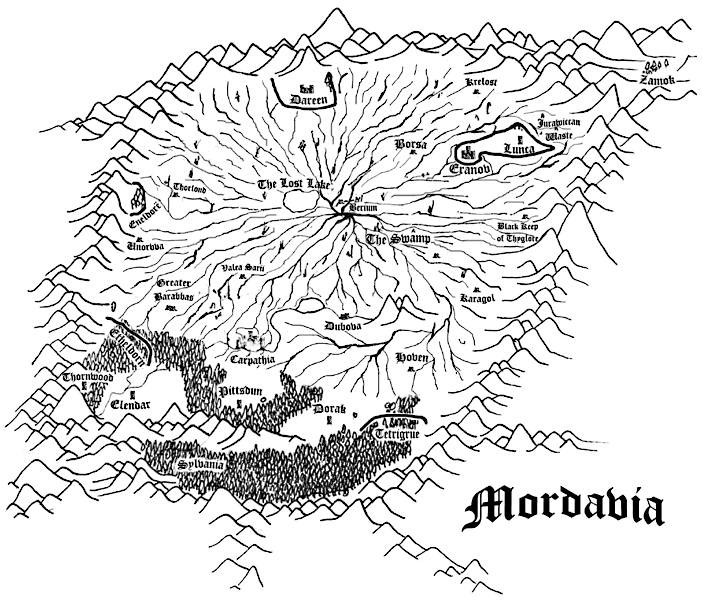 Context
As mentioned in the rules, Mordavia is a hidden magical kingdom set in Eastern Europe in
the middle of the 15th century. In most of the world magic is only rumoured at darkly, and monsters are just stories used to scare children.
But in Mordavia, these things are very much real. Mordavia is very difficult to enter or leave, but echoes of the strange things that
happen there are sometimes heard as fairy tales in other lands. Travellers who manage to escape from Mordavia are scoffed
at for their stories of fairies and the walking dead.
History
It is said among the wise that a great many centuries ago, when Europe was still in the fist of the Roman Empire, the whole of Mordavia
was just a little village in the mountains surrounded by pleasant alpine forests, somewhere in the Carpathian mountain ranges south of Translyvannia.
Then something happened that changed Mordavia forever.
Magic came to the land, the elves appeared in the forests, the gypsies started showing signs of their own unique abilities, and a bridge
was created to the land of Faerie. And slowly, almost imperceptably, Mordavia began to grow. Within a century, it was a small valley with
several towns. Less and less people from the outside world came, and travellers reported that when they tried to pass out over the
mountains, they became lost and found themselves back in Mordavia. Around this time, a legion of Roman soldiers somehow
found their way into the valley, but could not leave. The commander of this legion claimed control of Mordavia, and for while Mordavia
became a part of an empire with which it did not even have contact. Then came the monsters. Ogres and orcs filled caves beneath the
mountains. Vampire attacks left the people shuddering behind locked doors, clutching at crosses. Evil rituals were rumoured to be taking places
in the woods. Within a generation of fighting side-by-side with Mordavians, the Roman forces had become naturalised with the peoples of
Mordavia, many claiming lordship of villages, and soon forgot their ancestral ties to the Empire. The valley continued to magically
grow, and a King emerged from the town lords to rule the newly founded Kingdom of Mordavia.
Our story takes place about a thousand years later, in the midst of the fifteenth century. The people of Mordavia are largely unaware of their peculiar position in the world, or that magic is something unusual. What they are concerned by is the Swamp. Since a century ago when it first appeared, the Swamp has grown from a small foul patch in the middle of the valley (where the village of Berium is) to a enormous mire that has consumed hundreds of towns, villages, and elven forest realms in its wake. None but the orcs can pass the pestilent bog, and every year its borders creep inexorably outwards, threatening to consume the entire valley of Mordavia. And with the Swamp comes the undead. Whenever something dies in the Swamp or near to it, it is not long before it comes back. The people that die there don't return to their loved ones as themselves. They come back as ghouls, hideous mindless atrocities that devour all that stands before them. Even when buried, the dead of the Swamp can be heard scraping at the lids of their coffins, shrieking for blood from beneath the ground. Technology
Because of the lack of commerce with the outside world, technology in Mordavia has followed its own path.
Clothing has been influenced by the elven, fairy, and monster races. Armour and weapons have their own unusual flavour.
Sophisticated items like plate armour are very rare and valuable commodities. There are no firearms in Mordavia.
Geography and Politics
Mordavia is a small feudal kingdom surrounded by mountains. It is ruled by the King, Otto Peregrinus III, from the capital city Carpathia in the south.
The King has lords in manors in most areas of the Kingdom who pay him a fief, consisting of money, goods, and soldiers for his army.
The lords collect taxes from their local populace, some of which they pass onto the King. In the centre
of the Kingdom is the Swamp, that has been growing steadily over the last century. In the last twenty years the Swamp
has become so large and impassable that any who wish to travel between the north and the south have been forced to circle around
through the mountains, which are inhabited by numerous orcs and ogres, and considered very dangerous. During this time the Prince
who ruled in the north, a half-elven child of the King, gathered a following of his own soldiers and started a rebellion.
The uprising was made possible by the new floating road built across the Swamp by the King, which runs through the town of Berium
deep in the heart of the mire. The civil war that followed was bloody, but short. Although the Prince's forces had support
from the people, they were overwhelmed by the King's soldiers who had superior training and equipment. At the peak of the
struggle the Prince disappeared. More recently, the Prince re-emerged and was forgiven by the King and granted lordship of the
area of Berium.
The half-elven Prince's story is told in the Diary of the Prince, which was found in the crypt beneath Berium Keep. The story of his fall and subsequent return to glory is the talk of the Kingdom, and has made many an overbred noble lady blush. The Prince has since returned to rule in Eranov. Commoners regard the nobility as their social superiors, bowing and addressing them as “my lord” or “my lady.” Religion
Given the time period and location of Mordavia, the people should be very Christian. In practice, because of the extreme isolation from
the outside world, the people of Mordavia pray to whatever god or gods they think might be listening. The elves, orcs, gypsies, and
fairies all have their own concepts of the divine, and the King is happy to let any religion flourish that does not threaten his
land or his taxes.
Laws
Overview of Laws
There are three types of law in Mordavia: those that apply to tax-paying citizens, those that apply to outlaws (who typically
live in the wild), and those that apply to slaves. A citizen is defined as any person who currently pays taxes. When you pay to stay in an Inn, the
Innkeeper gives a portion of the taxes to the local Lord. Therefore you are considered a taxpayer. Unless you avoid paying
taxes on any trade you do, of course.
Tax
Every financial transaction in the Kingdom is subject to tax. The standard rate of tax is 1/4 of the value of the transaction.
The seller must pay over this tax to a designated tax collector for the area. The tax collector gives them a receipt for the tax.
The tax collector then passes on all taxes to the local Lord. The Lord usually passes some of the taxes back to the local
town Council for upkeep of employees and expenses of running the town.
Avoiding paying taxes on the part of the seller is tax fraud, and after a brief hearing the convict will be stripped of their citizenship, made a slave, and the profits of their sale will go to the local Lord as reparation. It is advisable for players to avoid losing their status as a citizen at all costs, as the alternatives are usually far from comfortable. Having said that, many gypsies, orcs and elves live in the wild, although the blight of the swamp is making such a lifestyle increasing difficult. Characters that want to enter human settlements are well advised to pay their taxes. Laws for Citizens
In such cases where a crime is said to have been commited by a Citizen, the accused should be tried by a judge, preferably a peer of the Kingdom, who will listen to arguments from any witnesses and from the defendant and observe any evidence and make a ruling as to guilt. Ignorance of the Law is not an excuse.
The punishments for crimes are laid out clearly below, and must be adhered to by the judge and by the Officer of the Law overseeing the case. In a situation where no such authority is available, the local populance may act on the law. Citizens that cannot pay fines may be imprisoned or whipped, at the discretion of the Officer of the Law. * Officers of the Law: These include any of the King's soldiers, the lord or steward of the area, the Sheriff of the town (as acknowledged by the Lord or his representatives), and any person deputised by that Sheriff. Officers of the law are responsible for keeping the peace in their town, and resolving conflicts between citizens. They may arrest and jail Citizens until such time as a peer is available to judge the accused. Officers of the law are also responsible for ensuring peace in any court of law, and dispensing punishments decided by a judge. * Disturbing the Peace: They that make the lives of other Citizens difficult by unruly behaviour are considered to be breaking the King's law by Disturbing the Peace. This is punishable by a fine between 5 and 10 kopeks, to go to the local Lord. * Theft: They that steal or destroy the possessions of others are Thieves, and their punishment should be in accordance with their reputation in the town. If they have committed theft before, they should be fined the value of the item and half the money should go to the owner, and half should go to the local Lord. They should also be made slave to the owner for a period of 1 day. Thieves that repeat their crime should be punished as above and also have their left hand removed. A third theft should be punished with removal of citizenship and permanent slavery. Profit from their sales shall repay the value of the theft, and any outstanding shall go to the local Lord. * Poaching: They that hunt the deer of the King without permission are Poachers, and should be fined a sum of 20 kopeks to go to the local Lord. * Murder: They that kill another person who pays the King's tax and is thereby considered a citizen of the realm are Murderers. The punishment for murder is death. The murderer should be imprisoned until such time as the town feels fit to stage a public execution. * Dueling: If a Citizen is killed in a duel to the death in which he or she agreed to participate it is not considered murder. For this law to apply the duel must be supervised by an officer of the law, being either a Sheriff of the town or a Soldier of King's Army. Officers of the law are advised to encourage Citizens to duel only until one side is subdued (by avoiding giving the coup de grace) but this is ultimately the decision of the duelers. * Treason: Treason against the King is also punishable by death. A judge, preferably a peer, should establish guilt. Any person who attacks the local Lord or any King's soldier is considered to be attacking the King himself, and therefore a Traitor deserving of death. * Town Laws: Local Laws and punishments may be declared at the discretion of the Town Council with the local Lord's approval. Outlaws
A person who does not pay taxes (and is not a slave) is outside the Law. Any attack on them or removal of items they
carry does not break the Law. However, if they are in fact Citizens, the Law for Citizens applies to them. Ignorance of the
Citizenship of a victim is not an excuse. Outlaws may be taken slave by any citizen, at the discretion of
the local Lord, who will provide papers of ownership.
Slaves
Slaves are considered to be the property of their owner. Destruction or theft of a slave is treated as Theft. The value
of a slave in a case of Theft is based on the market rate.
If a slave runs away their owner may declare them an Outlaw. Owners must carry the proper papers of Slavery for
their slaves, and transfer the papers to the new owner if the slave is sold. Slaves do not pay taxes,
because they cannot own property or buy goods or services, except on behalf of their owner.
Gypsies
Gypsies are not legally entitled to become Citizens. Unless they are a slave, they are not protected by the law and are
considered outlaws, even if they pay taxes. Most Mordavians feel that this is just, and that the filthy thieving gypsies
deserve nothing better. A few are more compassionate, and in some areas gypsies are treated almost like people.
Note that this attitude to gypsies reflects both historical and modern mindsets in many countries. The
organisers of Mordavia do not condone these bigoted attitudes.
The Town of Berium
Overview
Berium is a very small town located near the center of the Kingdom of Mordavia, deep in the Swamp. The town is
surrounded by a rather ill-favoured forest. The Trade Road road passes through the forest to the north and south of the
town as a paved road, and then out over the swamp as a floating road made of light wooden planks tied together. The floating
road is too weak to support horses or wagons, so it is mostly frequented by traders on foot. The swamp and forest
are very dangerous. Attacks by bandits, orcs, and ghouls are common in this region. Recently the floating road to the south of
Berium has been partially destroyed, and there is currently no passage in that direction through the Swamp.
Commerce with Carpathia is currently being organised by using the White spell Recall to get to an Astral Gate in Berium Keep.
The Gilthanas Inn
Travellers and traders gather at the Gilthanas Inn at Berium. The Inn is protected from the ghouls teeming in the forest by
Erana's Staff. Undead (including vampire player characters) must be invited to enter the area surrounding the Inn while the Staff is in place.
Erana's Staff is located in the field to the rear of the Inn, and can only be removed by use of very particular magics.
The Inn is owned by the elf lord Prince Megilindir, and managed by staff who answer to him.
The Keep
The Keep at Berium, previously known as Castle Borgov after the Borgov family, who were the first boyars (lords) of Berium.
Years ago the Keep was claimed by a Lady called Katrina, who claimed to be from the deceased Borgov line. Soon after Katrina
took control of the Keep, it became home to nest of Vampire Lords, who tried to take control of Berium. They were ousted
by a band of heros some years ago. The Keep then passed to Baron Mordikar. Mordikar was a cruel and ambitious lord,
and as a result of an uprising against him by the townsfolk and unsubstantiated claims that he was conspiring against
the King, he was removed from power in Berium. He was exiled to the Black Keep, an inhospitable castle in the barren
foothills on the eastern edge of Mordavia, that guards the orc-infested road that passes around the swamp. After that the
King granted lordship of the area to his son the half-elven Prince. Recently the Prince has returned to rule in his city of Eranov.
The fiefdom of Berium was contested in a tournament. The winner, Baron Underwood, claimed the township at the end of the Year of Our Lord 1462.
The Berium Sanctuary Bylaws
Baron Underwood has made a declaration of several bylaws for Berium, with the declared intent of reducing strife in the fiefdom so that all those who live there may struggle against the
Dark One together:
* Gypsies: All gypsies within Berium have the full protection of the law, provided they pay their taxes like anyone else. They shall also be subject to legal punishment. * Jurawiccan Elves: Berium provides a safe sanctuary for exactly seven Jurawiccan elves at any given time, as a measure to promote peace talks and the prospect of a country-wide truce. * Orcs: All orcs are welcome in the Inn and should be considered friendly unless they lash out at citizens, at which point they shall be handled on a case-by-case basis. Erana's Peace
A peaceful area in the forest, this is a place created by the druidess Erana who was a hero of Mordavia over a century ago.
Because of the spell she left on it, undead cannot enter the Peace unless they are invited. Follow the sign that says
"Chapel" from the main road to reach Erana's Peace.
The Dreaming Tower
A half-completed tower in the forest, the Tower of Dreams was built by a powerful wizard who was researching
magics that allowed him to travel in dreams. He disappeared two centuries ago.
The Lost Lake
To the south of Berium is a large Lake, with a sandy beach. The Lost Lake is very salty, probably from the marshes that
surround it. Foul and deadly behemoths are said to dwell beneath the surface of the lake, preventing boats from travelling
across it.
Gypsy Camps
Gypsies have been known to set up camp in the forest surrounding Berium. Their camps are very secretive, so if they are
discovered they will often move location overnight. The camps have some sort of gypsy sorcery that protects them from
the evils in the forest. Although many townsfolk would say that the gypies are safe because they are one of the
evils in the forest.
The Burial Mounds
To the west of Berium, just near the edge of the swamp, there was once a series of burials mounds. These mounds were
said to contain the remains of the Paladin, and the army that he raised to fight back the forces of the Dark One a
century ago. Recently the mounds have been flattened, although none can say why or how.
|
|||||||||||||||||||||||||||||||||||||||||||||||||||||||||||||||||||||||||||||||

